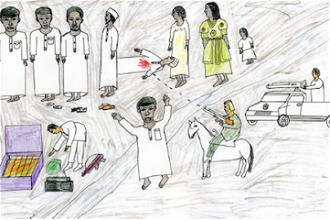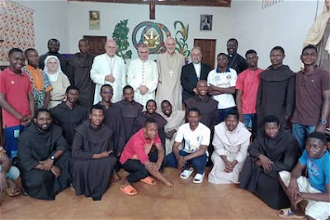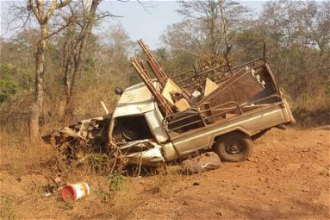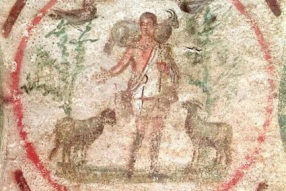Chad: Zarah's Choice - One woman's story of a family separated by war
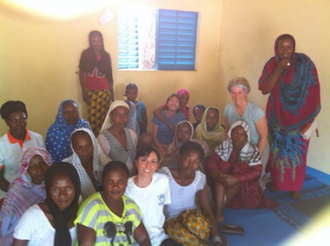
"My heart palpitates when I remember," says Zarah, a tall, slender woman in her forties, her long legs folded beneath her as she sits on a mat. "I'm OK during the day," she continues, "but at night it all comes back to me - the soldiers killing three people, right in front of me, at the market."
She pulls her Paisley pattern scarf to cover her hair. Despite the 45C degrees in the refugee camp in Chad, she is swathed in a floor-length blue and yellow dress, miraculously clean, given the dust and rubbish everywhere. It defies logic that this woman, who narrowly escaped death in her native Central African Republic, can emerge from her UN tarpaulin tent looking so elegant, her make up flawless, her ruby nail varnish unchipped.
"After what happened at the market I rushed home," Zara resumes, "I was afraid of what I'd find, and there was no one in the house, just chaos, furniture pulled apart. Everything worth taking was gone."
She sniffs back the tears, her rhinestone earrings swinging as her breathing shudders. "The people next door came over and told me my husband and kids escaped the soldiers and headed for the airport. So that's where I went next. I didn't stop to think I might not get a chance to return to the house for my possessions. I just fled."
But at the airport in Bangui, the capital of the Central African Republic (CAR), Zara found more chaos. Muslims like Zara were being evacuated by soldiers from France and African Union nations who had been sent to the CAR to restore order. Zara was put on a plane to N'djamena, in neighbouring Chad. From N'djamena she was taken hundreds of miles south, to the remote camps on the border with the CAR.
A shopkeeper by day and a taxi driver by night back in Bangui, Zara has little in common with many of the other refugees, beyond shared nationality and faith. They are traditional herders, illiterate and conservative. They disapprove of educating girls or letting women have lives beyond the home ("a waste of their eggs when they could have babies and take care of their men"). Their world, revolving around the value of a goat, is in contrast to the life Zara left behind in Bangui, where she was involved in civic society.
For months Zara has been trying to locate her husband and children, all the time wondering if they ever made it to the airport or were killed by the roaming bands of looting, anti-Muslim militia. Through the refugee grapevine she heard they had been sent west to Cameroon, and she was given a phone number. When she called it someone answered and then cut the connection when they heard her voice. No one answers the phone now when she calls. Either her family is dead, or they don't wish to be contacted by her. So Zara's choice is between two different forms of heartbreak: rejection or bereavement.
Thousands of refugees face this uncertainty, wondering what has become of their families. It can take months, and a lot of persistence, to trace relatives who have been sent to different camps or countries. Inevitably, the suspicion grows that missing loved ones lie in unmarked mass graves. If ever there was a need for "closure," it is this.
In the meantime, Zara prays the violence in the CAR will end so she can return to her big city life. She is reluctant to discuss the roots of the war. This isn't
surprising since she shares the refugee camp with people who were 'ethnically cleansed' by the largely Muslim Seleka ('union' in the Sango language) militia.
Zara's family was targeted by the non-Muslim anti-balaka ('machete') militia who are avenging the deaths of Christians at the hands of Seleka. There may be tensions between Christians and Muslims in the camp, but they are mostly unspoken because no one wants the violence to erupt here, in their place of safety. Moreover, Muslims and Christians have previously lived in harmony until stirred up by various irresponsible factions. Everyone prays negotiations - the Bangui Forum, which resumed in early May - will lead to genuine peace so they can leave this baking hot, inhospitable region and go home.
The conflict in CAR is often characterized by commentators as religious because it is convenient to do so. Yet, there are other factors requiring long-term solutions; livestock herders and nomads against farmers, all in competition for viable land as the Sahara shifts south due to climate disruption; merchants versus farmers and herders; the privileged and corrupt ruling elite against the unemployed, illiterate young men who have no hope of breaking the elite's grip on wealth and power.
Back in the camp, the elders, all male, are dumbfounded when asked if they will adapt their way of life, following the changes brought about by the war. Will they encourage their children to go to school and learn skills that might be applied beyond the keeping of livestock? In contrast with Zara, who is always looking for commercial opportunities within the camp, the elders cannot imagine anything other than their traditional lifestyle. In this respect the traditional rural Muslim elders have more in common with fellow livestock-herding Christian elders than they do with big city Muslims like Zara.
In refugee camps across the world women like Zara have little choice but to adapt. Hence the attention they give to looking their best, never allowing their
circumstances to defeat them. Those with children must make an extra effort to provide some normality. Like thousands of others, Zara left home in a hurry without her identification papers, and with only the clothes on her back. She had to convince the UN authorities she is who she says she is. Otherwise she would be stateless, without the card needed to claim her weekly World Food Program ration. That ration gets smaller all the time because the nations contributing to the UN budget are sending their money to other conflicts that have grabbed more headlines.
Meanwhile, Zara keeps phoning the number she was given, praying someone will answer.
Interview conducted in Chad in April 2015. Zara's name and some details have been changed for her protection.
For more information see Network For Africa www.Network4Africa.org



